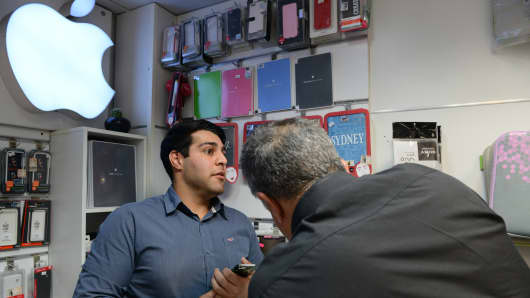In the United States, Tim Cook's public revelation that he is gay is one thing. On the international front, it is quite another.
Homosexuality in some parts of the world is considered immoral, even criminal. Yet that is where a majority of Apple's business is. Nearly 60 percent of the company's revenues came from outside the Americas, according to its latest earnings report.
Homosexuality in some parts of the world is considered immoral, even criminal. Yet that is where a majority of Apple's business is. Nearly 60 percent of the company's revenues came from outside the Americas, according to its latest earnings report.
Just this morning the Wall Street Journal has a story about Apple
holding talks about selling its products in Iran should U.S. sanctions
on that country ease. Homosexuality is against the law in Iran, in some
cases punishable by death. One wonders what stance the government there
would take over importing products from a company with an openly gay
CEO.
Indeed, anti-gay sentiment is prevalent in the Middle East, albeit to
varying degrees depending on the country. Yet one of Apple's largest stores is being built in Dubai.
Russia is another potential problem. Apple sold 1.6 million iPhones in the country last year. Yet the Vladmir Putin government is not renowned for its tolerance of homosexuality. Its laws against "LGBT propaganda" have prompted condemnation from various international rights groups. And the Russian attitude appears to be well-known in former Eastern Bloc states.
And then there's China, where Apple both sells (about $6 billion worth in the fourth quarter) and makes phones. The Communist regime there was anti-gay throughout most of the 20th century. Homosexuality was decriminalized there in 1997. But it was only in 2001 that homosexuality was declassified as a mental illness. And while homosexuality is legal in the country, civil rights groups still report a high degree of intolerance.
To be sure, intolerance isn't confined to markets overseas. Here in the United States there are plenty of people vehemently opposed to homosexuality.
"Some people think it's cool to be gay nowadays, I think it's disgusting," wrote one commenter on our coverage.
Despite such attitudes, given recent changes in state law and various court rulings, the preponderance of public opinion in the United States seems to be toward acceptance.
Nevertheless, it is still a divisive social issue with a business impact. No one can argue that Cook's move isn't a brave and positive step. But it does raise questions about the company's prospects in some areas overseas.
Indeed, anti-gay sentiment is prevalent in the Middle East, albeit to
varying degrees depending on the country. Yet one of Apple's largest stores is being built in Dubai.
Russia is another potential problem. Apple sold 1.6 million iPhones in the country last year. Yet the Vladmir Putin government is not renowned for its tolerance of homosexuality. Its laws against "LGBT propaganda" have prompted condemnation from various international rights groups. And the Russian attitude appears to be well-known in former Eastern Bloc states.
And then there's China, where Apple both sells (about $6 billion worth in the fourth quarter) and makes phones. The Communist regime there was anti-gay throughout most of the 20th century. Homosexuality was decriminalized there in 1997. But it was only in 2001 that homosexuality was declassified as a mental illness. And while homosexuality is legal in the country, civil rights groups still report a high degree of intolerance.
To be sure, intolerance isn't confined to markets overseas. Here in the United States there are plenty of people vehemently opposed to homosexuality.
"Some people think it's cool to be gay nowadays, I think it's disgusting," wrote one commenter on our coverage.
Despite such attitudes, given recent changes in state law and various court rulings, the preponderance of public opinion in the United States seems to be toward acceptance.
Nevertheless, it is still a divisive social issue with a business impact. No one can argue that Cook's move isn't a brave and positive step. But it does raise questions about the company's prospects in some areas overseas.

Allen WastlerManaging Editor, CNBC.com


No comments:
Post a Comment